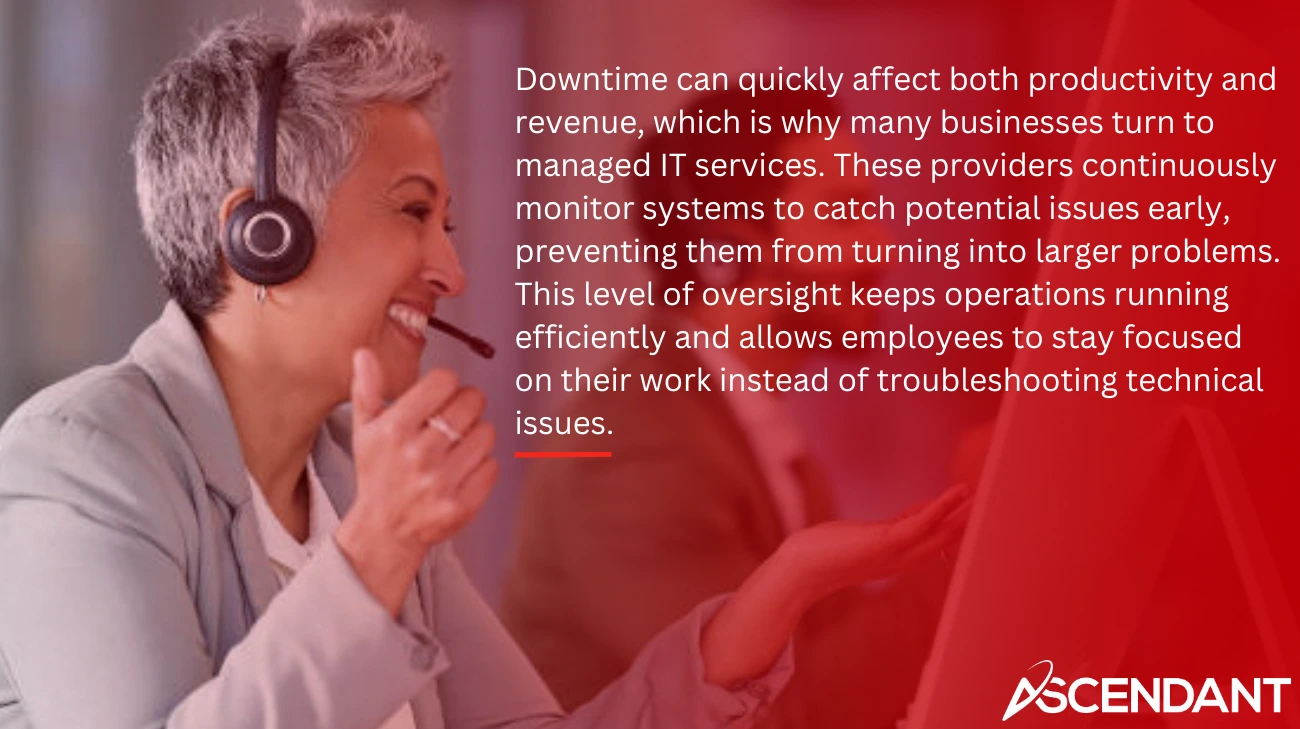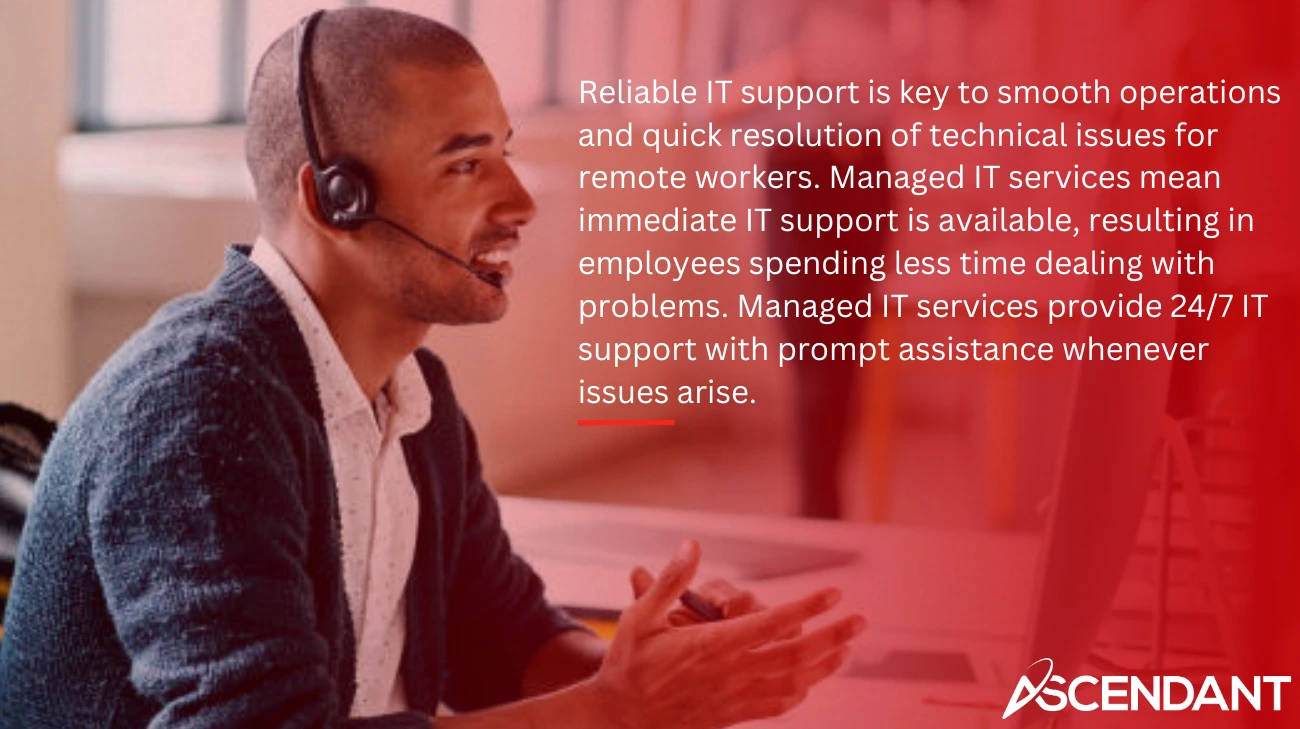Managed IT services can boost employee productivity. By handling technical issues, updating systems and providing fast support, these services let your team focus on what they do best. In this article we’ll look at how managed IT services improve productivity, efficiency, downtime, security and communication.
In This Article:
- Efficiency
- Downtime
- Security
- Collaboration and Communication
- Remote Work
- Innovation and Employee Empowerment
- Cost and Budgeting
- Employee Experience
Key Points
- Managed IT services improve efficiency through proactive maintenance, minimal disruption and employees focusing on core tasks.
- Quick resolution of IT issues and continuous monitoring is key to productivity, downtime and business continuity.
- Robust security measures implemented by managed IT services creates a safe digital environment, employee confidence and overall productivity.
Efficiency
Efficiency is at the heart of managed IT services. Outsourcing IT means employees can focus on what they do best without technical distractions. This means better performance and a smoother workflow. Managed IT services means IT systems are optimized and protected from threats, means better productivity and efficiency.
One of the benefits of managed IT services is their proactive approach to maintenance. Regular maintenance of IT systems prevents potential disruptions and ensures they’re running optimally. This proactive maintenance keeps systems running smoothly and minimizes the duration and impact of IT disruptions. By addressing issues before they escalate managed IT services improves overall productivity and cost.
In addition to proactive maintenance managed IT services provide quick resolution of IT issues. Effective rapid response means business continuity and minimal impact on employee productivity. This quick fix reduces the duration of technical downtime, employees can focus on what they do best without prolonged downtime. Managed IT services also allow businesses to leverage the latest technology; employees have the tools to do their job.
Proactive Maintenance
Regular maintenance by managed IT services keeps systems running smoothly, prevents potential disruptions and ensures optimal functionality. Managed IT services keep IT systems optimized and protected from threats through proactive maintenance and updates. This reduces downtime and improves security, a reliable managed IT environment for employees to do their job.
Troubleshooting early means minimal disruption to business and minimal downtime.
Quick Resolution of IT Issues
Quick resolution of IT issues is key to employee productivity. Managed IT services provides rapid response to software glitches and technical issues, minimal downtime. This quick fix means employees can focus on what they do best without interruptions. Rapid response means business continuity and minimal impact on productivity. Addressing IT issues means overall productivity and employees can focus on what they do best.
Technology
Managed IT services means businesses can leverage the latest technology, employees have modern tools and solutions. Access to up-to-date technology means creativity and innovation in the workplace, employees can do their job better. Managed IT services also integrates unified communication tools that improves team collaboration and employee productivity.
Seamless integration of CRM systems and collaboration tools means overall productivity and efficiency. Subscription models for IT services means predictable budgeting and cost control, businesses can invest in better tools.
Downtime

Downtime can quickly affect both productivity and revenue, which is why many businesses turn to managed IT services. These providers continuously monitor systems to catch potential issues early, preventing them from turning into larger problems. This level of oversight keeps operations running efficiently and allows employees to stay focused on their work instead of troubleshooting technical issues.
When problems do occur, managed IT teams respond quickly to get systems back online. Their fast support helps reduce interruptions and keeps remote and in-office employees productive. By resolving disruptions promptly, managed IT providers help businesses maintain steady workflows and consistent performance.
Continuous Monitoring
Managed IT services use continuous monitoring to identify potential issues before they disrupt business operations. Automated tools detect early warning signs and allow for proactive maintenance, preventing larger problems from developing. This ongoing oversight keeps systems dependable and reduces downtime, helping employees stay focused and productive.
Rapid Response
When technical problems occur, managed IT services act quickly to resolve them and limit downtime. Around-the-clock monitoring allows for immediate detection and fast corrective action. Reliable IT support helps maintain consistent productivity, particularly for remote teams that depend on stable systems. Quick responses ensure operations stay on track and give employees confidence that any issues will be handled promptly.
Security
A secure digital environment means employee confidence which means productivity. Managed IT services uses firewalls, encryption and regular software updates to protect against cyber threats. These strong security measures means employees can work confidently, overall productivity. Also secure remote access solutions means sensitive company data is protected when employees work remotely by implementing strong access controls.
Robust security solutions by managed IT services includes antivirus software, firewalls, Intrusion Detection Systems (IDS) that detects breaches and Intrusion Prevention Systems (IPS) that blocks potential threats. These security measures work together to give visibility to the IT infrastructure, enables quicker response to emerging security threats. Managed IT services often combines these different security tools to strengthen overall defense mechanisms, means a secure and reliable environment for business and employee productivity.
This means visibility to the IT infrastructure, enables quicker response to emerging security threats. Managed IT services often combines firewalls and antivirus solutions to enhance overall security defenses.
Data backup and recovery is key to minimize data loss and quick recovery in case of incident. A solid backup strategy is the last line of defense against data loss due to cyberattacks or disasters. Regular backups means organizations can quickly restore data and minimize operational disruption during data loss incidents.
Robust Security Solutions
Managed IT services implements robust security solutions to combat cyber threats, includes antivirus solutions, firewalls, Intrusion Detection Systems (IDS) that detects breaches and Intrusion Prevention Systems (IPS) that blocks potential threats. These security measures are provided by a managed IT service provider to ensure overall protection for business and data.
This means visibility to the IT infrastructure, enables quicker response to emerging enhanced security threats.
Managed IT services often combine different security measures to enhance overall security defenses.
Data Backup and Recovery
Regular data backups by managed IT services are key to minimize data loss and quick recovery in case of incident. A solid backup strategy is the last line of defense against data loss due to cyberattacks or disasters.
Regular backups means organizations can quickly restore data and minimize operational disruption during data loss incidents.
Collaboration and Communication
- Allows teams to access real-time information from one platform, improves collaboration.
- Reduces misunderstandings and fosters teamwork, means higher productivity levels.
- Integrates collaboration tools with CRM systems to support better workflow and reduce administrative tasks.
Seamless integration of CRM systems and collaboration tools by managed IT services means workflow efficiency. Streamlined communication by managed IT services means team collaboration, means increased productivity. Unified communication tools integrated by managed IT services, such as video conferencing and messaging platforms, means better interaction. Integrating these tools means improved employee productivity and operational efficiency across the organization.
Unified Communication Tools
Unified communication tools reduces operational delays by providing real-time presence information about colleagues. Effective unified communication systems allow teams to access real-time information from one platform, improves collaboration.
Effective communication platforms reduce misunderstandings and foster teamwork, means higher productivity levels and project management platforms.
Seamless Integration
Seamless integration of a CRM system and collaboration tools by managed IT services means workflow efficiency. Streamlined communication by managed IT services means team collaboration, means increased productivity.
Unified communication tools integrated by managed IT services, such as video conferencing and messaging platforms, means better interaction. Integrating these tools means improved employee productivity and operational efficiency across the organization.
Remote Work
Remote work is essential in today’s business. Managed IT services means communication tools are more functional, means smoother interactions among employees. They adapts to growth or fluctuations in demand by providing right support levels without over- or under-resourcing, means flexibility to ensure right level of assistance. Reliable IT support is key to smooth operations and quick resolution of technical issues for remote workers. Managed IT services provides instant IT support, means employees spend less time dealing with problems, 24/7 availability to assist whenever issues arise. When an IT issue is detected, immediate intervention prevents disruption to workflows, means quick resolution that keeps employee work schedule on track and productivity.
Secure remote access solutions by DesignRush means business data is protected and employee productivity is enhanced. These solutions means flexibility and remote work setup, means modern business success. Also means quick troubleshooting and expert support for remote employees to ensure smooth operations and reduce downtime. Strong security measures by managed IT services means business data is protected, means employee confidence and productivity.
IT Support

Reliable IT support is key to smooth operations and quick resolution of technical issues for remote workers. Managed IT services mean immediate IT support is available, resulting in employees spending less time dealing with problems. Managed IT services provide 24/7 IT support with prompt assistance whenever issues arise.
IT support steps in immediately to resolve concerns when an IT issue is noted, means no disruption to workflows. Quick resolution means employee work schedule on track and productivity.
Secure Remote Access
Secure remote access solutions by managed IT services means business data is protected and employee productivity is enhanced. Managed IT services means flexibility and remote work setup, means modern business success. Means quick troubleshooting and expert support for remote employees to ensure smooth operations and reduce downtime.
Strong security measures by managed IT services means business data is protected, means employee confidence and productivity.
Innovation and Employee Empowerment
Managed IT services help inspire innovation and give employees the tools they need to do their jobs effectively. Keeping technology up to date creates a strong foundation for creativity and problem-solving. Access to secure systems and reliable modern technology helps employees focus on improving workflows and developing new ideas that drive business growth.
These services also encourage ongoing learning. Regular support and training help employees stay current with new technologies and build valuable skills. This commitment to growth improves productivity and creates a stronger and more engaging work environment.
Access to Modern Tools
Access to modern tools is key to creativity and productivity among employees. Managed IT services means employees use latest technological tools for their productivity. Using up-to-date technology through managed IT services means employee creativity and productivity.
Provision of modern tools by managed IT services, along with their expertise, means productivity and overall workplace innovation and efficiency.
Continuous Learning Opportunities
Continuous learning opportunities by managed IT services means effectiveness of employee training programs. Ongoing support from managed IT services means employees can continuously improve their skills and stay updated with latest technological advancements.
This continuous learning means increased job satisfaction and overall employee experience.
Cost and Budgeting
Managed IT services means long term cost savings compared to having an in-house IT team. Outsourcing IT services means reduction in costs for equipment, infrastructure and maintenance. This eliminates many direct costs associated with in-house staffing such as employee benefits and equipment investments. Managed IT services helps organizations to plan their finances better by providing stable and predictable expenses.
Subscription models for IT services typically involves recurring payments that gives businesses predictable costs for their IT needs. Businesses adopting subscription models for IT services means better cash flow management and more accurate budgeting. The subscription model for IT services means IT support is no longer reactive but a proactive partnership. Many managed IT services offer tiered pricing options, means businesses can choose service levels that suits their financial needs. Utilizing subscription models means financial predictability and cost control, means strategic choice for managing IT expenses.
Outsourcing IT management means substantial reduction in overhead costs. This means companies can save money efficiently. This means cutting down costs associated with salaries, benefits and training that comes with having a large in-house IT team. Leveraging technology through managed IT services means businesses achieve operational efficiency and cost savings, means productivity gains.
Subscription Models
Subscription models for IT services typically involves recurring payments that provides businesses with predictable costs for their IT needs. Businesses adopting subscription models for IT services means better cash flow management and predictable budgeting. The subscription model for IT services means reactive support is no longer but a proactive partnership.
Many managed IT services offer tiered pricing options, means companies can choose service levels that align with their specific financial needs. Utilizing subscription models for managed IT services means financial predictability and effective cost control.
Reduced Overhead Costs
Outsourcing IT management can lead to a substantial reduction in overhead costs. This means companies can save money efficiently by:
- Cutting down costs associated with salaries
- Reducing expenses related to benefits
- Minimizing training costs that comes with maintaining a large in-house IT team.
Leveraging technology through managed IT services means businesses can leverage technology to achieve operational efficiency and cost savings, means productivity gains.
Employee Experience
A secure digital environment means employees trust, which can boost their overall productivity. Managed IT services secure digital workspace, protects sensitive data and boosts employee morale and trust in the organization. Continuous training and development means increased creativity, internal growth, satisfaction, reduced turnover and better talent attraction. Reliable IT support means training initiatives are more productive and helpful, reduces frustration throughout the process.
Reducing technical frustrations is key to employee experience. Automating routine tasks can significantly reduce technical frustrations for employees. Using a centralized platform to manage tasks and communications can improve user experience and reduce frustration among IT professionals. Clearly defining team responsibilities can minimize constant interruptions, means more enjoyable work environment. Implementing a standardized technology stack can simplify processes, means fewer technical complexities for employees. Improving job satisfaction is key to maintaining employee productivity and managed IT services contributes to this by ensuring systems run smoothly, means fewer technical issues and employees can focus on their core tasks. They also mean quick resolution of software glitches and other IT issues, means less downtime and overall productivity.
Reducing downtime is key to employee productivity; managed IT services mean preventing and addressing IT disruptions. Effective IT support means fewer technical frustrations, means higher employee satisfaction and retention.
Reducing Technical Frustrations
Reducing technical frustrations is key to employee experience. Automating routine tasks can significantly reduce technical frustrations for employees. Using a centralized platform to manage tasks and communications can improve user experience and reduce frustration among IT professionals.
Clearly defining team core responsibilities can minimize constant interruptions, means more enjoyable work environment. Implementing a standardized technology stack can simplify processes, means less technical complexities for employees.
Improving Job Satisfaction
Improving job satisfaction is key to maintaining employee productivity. Managed IT services mean:
- Systems are running smoothly, means fewer technical issues and employees can focus on core tasks.
- Quick resolution of software glitches and other IT issues.
- Less downtime and more productivity.
Reducing downtime is key to employee productivity; managed IT services mean preventing and addressing IT disruptions. Effective IT support means fewer technical frustrations, means higher employee satisfaction and retention.
Summary
Managed IT services are a must have for modern businesses, operational efficiency, downtime reduction, data security and remote work. They bring innovation and employee empowerment, means cost savings and better budgeting. Focus on core tasks and reduce technical frustrations, managed IT services mean employee productivity and job satisfaction, means business success and growth.
 Frequently Asked Questions
Frequently Asked Questions
How do managed IT services enhance employee productivity?
Managed IT services significantly boost employee productivity by minimizing tech-related distractions, enabling staff to concentrate on their primary responsibilities, and ensuring prompt resolution of IT issues while utilizing the latest technology to optimize workflows.
What role does proactive maintenance play in managed IT services?
Proactive maintenance is essential in managed IT services as it ensures systems operate efficiently, prevents disruptions, and significantly reduces downtime. By implementing regular upkeep, businesses can maintain optimal functionality and enhance overall performance.
How do managed IT services support remote work?
Managed IT services facilitate remote work by delivering dependable IT support, secure remote access, and functional communication tools, which enhance collaboration among remote employees.
What are the benefits of using subscription models for IT services?
Utilizing subscription models for IT services provides predictable costs and better cash flow management, enabling businesses to proactively address their IT needs while aligning service levels with their financial capabilities. This approach fosters a strategic partnership rather than merely reactive support.
How do managed IT services improve data security?
Managed IT services significantly enhance data security by deploying advanced security measures like firewalls and intrusion detection systems, coupled with regular data backups and secure remote access. This proactive approach ensures that sensitive business data is well-protected against potential threats.

